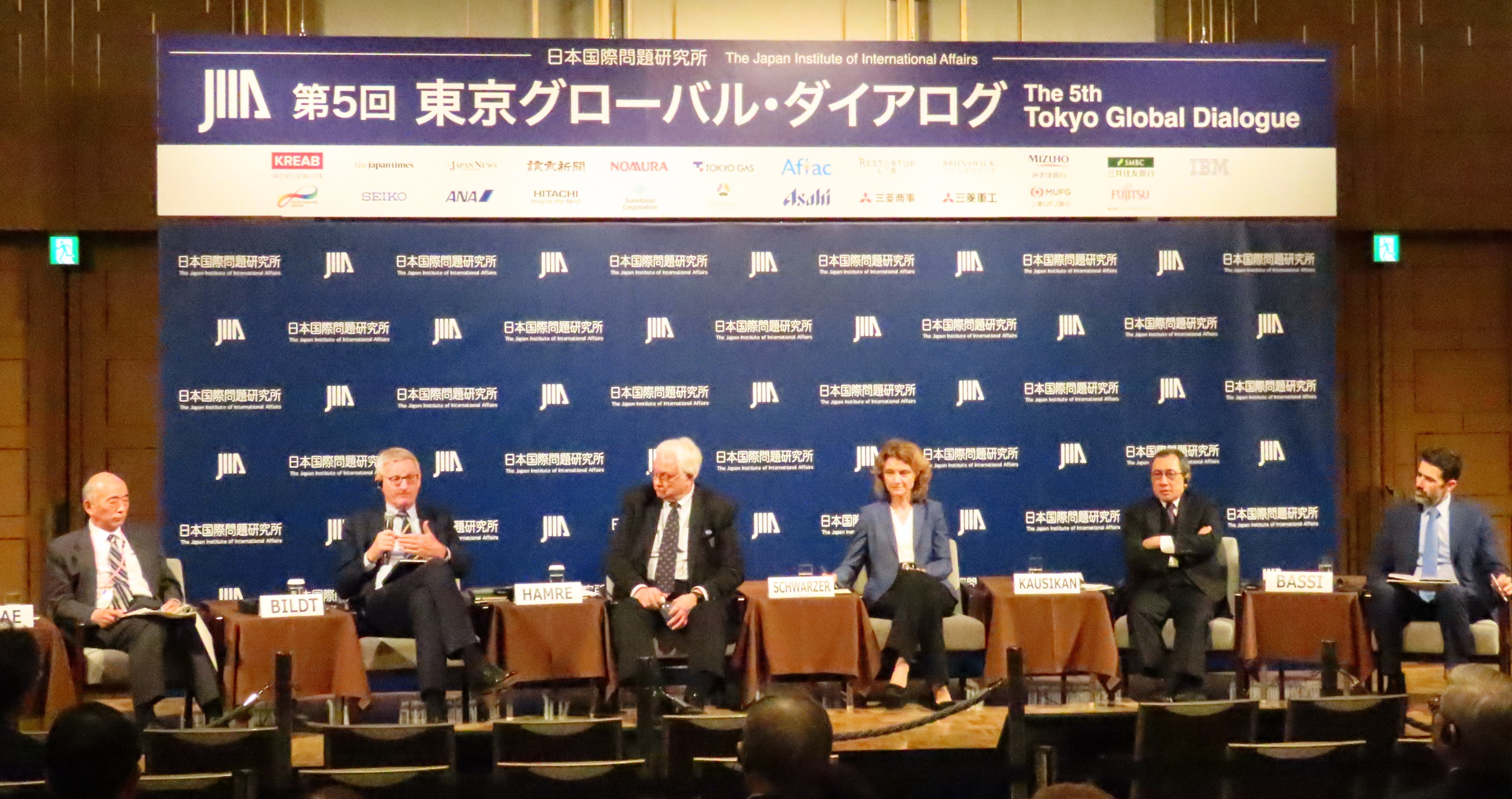The Japan Institute of International Affairs (JIIA) held the 5th Tokyo Global Dialogue (TGD5) on Wednesday, February 28 and Thursday, February 29 in Tokyo (at The Okura Tokyo).
On the first day, H.E. Mr. Fumio Kishida, Prime Minister of Japan, delivered the opening address and H.E. Ms. Yoko Kamikawa, Minister for Foreign Affairs of Japan the keynote speech. On the second day, panel discussions were held on six themes, on which experts and specialists from Japan and abroad engaged in lively discussions.
This year, for the first time, all sessions were held in a hybrid format, with approximately 800 participants registered from around the world.
1. Outline
(1) Dates
February 28, 2024 (Wednesday) 5:00 p.m. to 7:20 p.m.
February 29, 2024 (Thursday) 9:00 a.m. to 6:30 p.m.
[Program] https://www.jiia.or.jp/TGD/tgd5/en/
(2) Venue
The Okura Tokyo (Minato-ku, Tokyo) and online
(3) Number of participants (number of invitees for on-site participation, number of pre-registered participants for both on-site and online participation)
On-site participants: Over 360 people in total
Registrants for online participation: approx. 800 people
2. Speakers: Approximately 30 speakers from 20 countries/regions, including online speakers
[Japan] *In order of appearance (excluding JIIA staff)
H.E. KISHIDA Fumio, Prime Minister of Japan
H.E. KAMIKAWA Yoko, Minister for Foreign Affairs
Satoru Mori, Professor, Keio University
Mihoko Matsubara, Chief Cybersecurity Strategist, NTT Corporation
Kazumi Nishikawa, Director, Office of Economic Security Policy, Trade and Economic Cooperation Bureau, Ministry of Economy, Trade and Industry (METI); Director, Policy Planning and Coordination Division, Trade and Economic Cooperation Bureau, METI
Kazuto Suzuki, Professor, University of Tokyo
Atsuko Kanehara, Research Director for the Canon Institute for Global Studies
Koichi Nakagawa, Adjunct Fellow, The Japan Institute of International Affairs (JIIA)
Takako Hikotani, Professor, Gakushuin University
Kenichiro Sasae, President, The Japan Institute of International Affairs (JIIA); Former Ambassador of Japan to the U.S.
Tetsuo Kotani, Senior Fellow, The Japan Institute of International Affairs (JIIA); Professor, Meikai University
[Overseas] *Alphabetical order by last name
Justin Bassi, Executive Director, Australian Strategic Policy Institute (ASPI) (Australia)
Henry S. Bensurto, Jr., Ambassador of the Philippines to Türkiye (Philippines) (online participant)
Carl Bildt, Former Prime Minister of Sweden; Vice Chairman, Kreab Worldwide (Sweden)
Bill Emmott, Chairman of the Trustees, The Institute for International Strategic Studies (IISS) (UK) (online participant)
Matthew Goodman, Director of the Greenberg Center for Geoeconomic Studies, Council on Foreign Relations (CFR) (USA) (online participant)
Alex Gray, CEO, American Global Strategies LLC; Former Chief of Staff of the White House National Security Council (NSC) (USA)
John Hamre, President and CEO, Center for Strategic and International Studies (CSIS) (USA)
Seok-Hee Han, President, Institute for National Security Strategy (INSS) (Republic of Korea)
Norah Huang, Research Fellow, Prospect Foundation (Taiwan)
Jia Qingguo, Professor, Peking University (China)
Bilahari Kausikan, Chairman, The Middle East Institute, National University of Singapore (Singapore)
Michelle Lee, Tokyo Bureau Chief, The Washington Post (USA)
Alina Miron, Professor of International Law, University of Angers; A founding partner of FAR Avocats (France)
Daniela Schwarzer, Member of the Bertelsmann Stiftung Executive Board (Germany)
Hemant Krishan Singh, Director General, The Delhi Policy Group (DPG); Former Ambassador of India to Japan (India) (online participant)
Alfred Soons, Emeritus Professor of Public International Law, Utrecht University (Netherlands)
Henry Huiyao Wang, President, Center for China and Globalization (CCG); Former Counselor to China State Council (China) (online participant)
3. Outcomes
(1) Wednesday, February 28
① Roundtable featuring "Strategic Annual Report 2023"
-
The Strategic Annual Report 2023 argues that the world is facing the "three fronts", namely, the war in Ukraine, competition between the US and China, and crisis in the Middle East. These, along with the severe division within the US, have become obstacles to addressing matters of global governance issues such as the slow progress being made in resolving global issues such as climate change and the dysfunction of the United Nations (UN). The roundtable discussion was based on the gist of this report.
-
Given the possibility that Donald Trump may return to power as a result of the US presidential election in November, each speaker discussed the geopolitical impact and the future of diplomacy with the US from his or her own point of view. Concerns were expressed about the reemergence of an "inward-looking" US orientation, which has been seen from time to time in US history, and about dealing with circumstances based on the experience of the first Trump administration.
-
The strategic significance of Sweden's full membership in NATO as well as the implications for the future security of Europe as a whole were discussed, especially by the speakers from Europe. The speakers also discussed the role of alliances and partnerships in the Indo-Pacific region in maintaining global security, with reference to AUKUS and the Quad.
② Opening
-
President Sasae gave an opening address, welcoming participants from around the world. He emphasized the significance of holding all sessions face-to-face for the first time in four years, saying that the world is in the midst of turmoil, that the wisdom of democracy and the international community is being tested, and that it is important for the Dialogue, which has become a forum for international dialogue in Tokyo, gathering the best experts of the day to stimulate discussion.
-
Prime Minister Fumio Kishida then greeted the audience, and Foreign Minister Kamikawa delivered the keynote speech.
[Reference]
(2) Thursday, February 29
① Part 1
-
Under the theme of "US-China Competition and the Indo-Pacific," two sessions on "Politics & security" and "Economic security" were held.
-
In the "Politics & security" session, the discussion focused on the US-China relationship in the Indo-Pacific, where the regional situation is becoming more complex. The importance of managing the bilateral relationship was expressed, as neither the US nor China can push the other out of the Asia-Pacific. Regarding Taiwan, it was emphasized that both China and Taiwan should refrain from provocative actions and that China should not misjudge the US military power and its cohesion with its allies. The impact of a Taiwan contingency on the Korean Peninsula was also discussed.
-
In the "Economic security" session, there was first an in-depth exchange on what "economic security" means, with speakers offering their individual interpretations. They also exchanged opinions on various issues and prospects surrounding economic security, bearing in mind national policies to secure strategic advantages against the backdrop of the US-China competition, international cooperation, efforts to ensure economic security, and cyber security measures that are urgently needed.
② Part 2
-
Under the theme of "Changes in the security environment and Japan's responses," two sessions were held: "Japan's National Security Strategy and future challenges" and "Territory, sovereignty and the rule of law".
-
In "Japan's National Security Strategy and future challenges," the discussions from Part 1 were carried forward, touching on the risk that China may miscalculate that the balance of power in East Asia is shifting in its favor, and the possibility that this could trigger a Chinese invasion of Taiwan. The importance of support and cooperation from the liberal camp on the Ukrainian front in forestalling such miscalculations was emphasized. Similarly, it was pointed out that relations between Russia and North Korea have developed into military cooperation, which poses a threat to regional peace and stability and requires deterrence through strengthened trilateral cooperation among the United States, Japan, and South Korea. The discussion also covered the potential re-election of Donald Trump as US president, and the prospects of the policy of enhancing military coordination through the security architecture in the Indo-Pacific (e.g., the Quad and AUKUS) continuing.
-
"Territory, sovereignty, and the rule of law" discussed how the international community should respond to the threat of unilateral attempts to change the status quo by force for the "rule of law" to function, especially in issues concerning territory and sovereignty. The experts from Japan, the Philippines, France, and the Netherlands discussed in detail from an international legal perspective such issues as judicial means of settling international disputes, the South China Sea dispute, and unilateral sanctions.
③ Part 3
-
Under the theme of "Ukraine and the Middle East: The advent of an era of perennial conflict and the future of international security and cooperation," two sessions were held: "Perennial conflict: how do we deal with the "three fronts" of Ukraine, the Middle East and Asia?" and "The Future of International Security and Cooperation".
-
"Perennial conflict: how do we deal with the "three fronts" of Ukraine, the Middle East and Asia?" featured an in-depth discussion on how to create a scenario that does not end with a Ukrainian defeat and a Russian victory. The key to dealing with the "three fronts" is to bolster cooperation and communication among nations so that the support of the West is projected to the maximum extent possible, and the view was expressed that compromise in Ukraine would lead directly to the collapse of the rule of law in the Indo-Pacific. Concerns about China's growing power in the Middle East were expressed, and the nature of messaging to China to deter a Taiwan contingency was also discussed.
-
In the concluding session, "The future of international security and cooperation," the speakers were asked to reflect on the discussions in this round of dialogues and on the lessons that could be drawn from them. The discussion then evolved into a heated debate on the role Japan should play in a world in turmoil and the kinds of partnerships it should build. The speakers also shared their views on the results they expected from Prime Minister Kishida's visit to the US scheduled for April.
④ Closing
-
President Sasae gave a summary of the discussions on the various aspects of a "world in turmoil" and the "three fronts" that emerged upon review of the outcomes of the two-day deliberations, and of the paths that should be taken by each country in the future. *Click here for the main points of the "Closing Remarks".
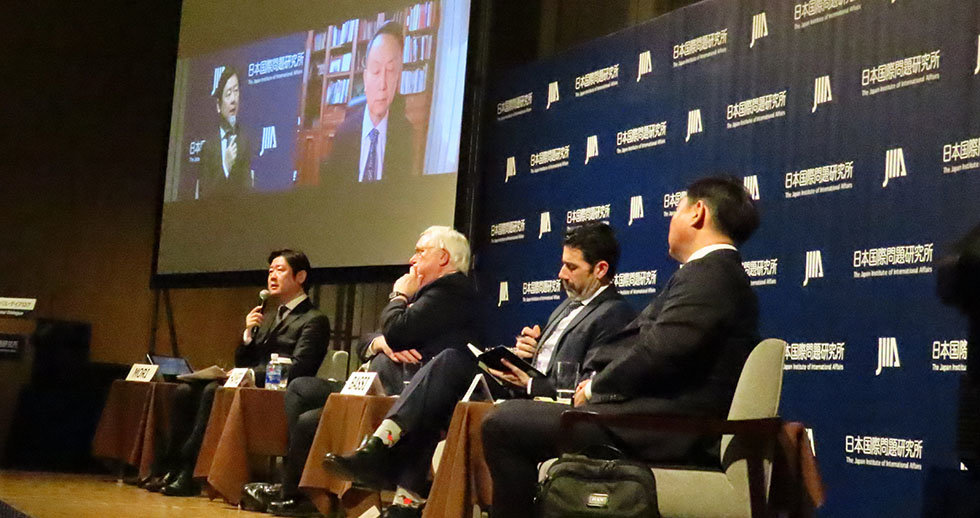 Part 1: US-China competition and the Indo-Pacific (1) Politics & security |
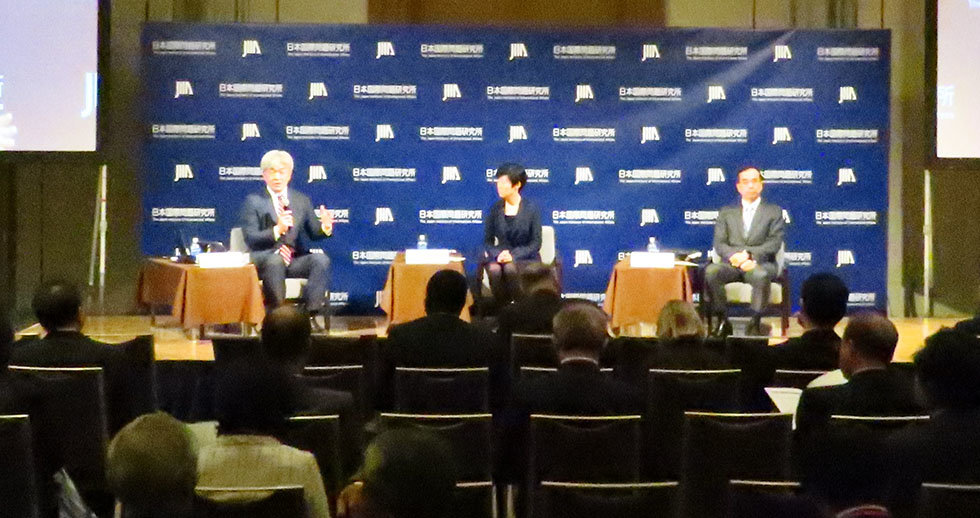 Part 1: US-China competition and the Indo-Pacific (2) Economic security |
|
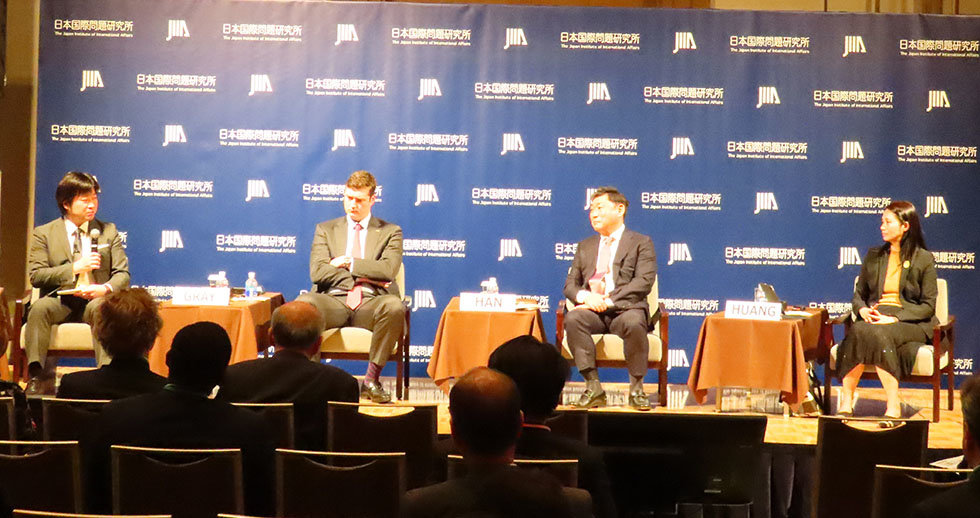 Part 2: Changes in the security environment and Japan's responses (1) Japan's National Security Strategy and future challenges |
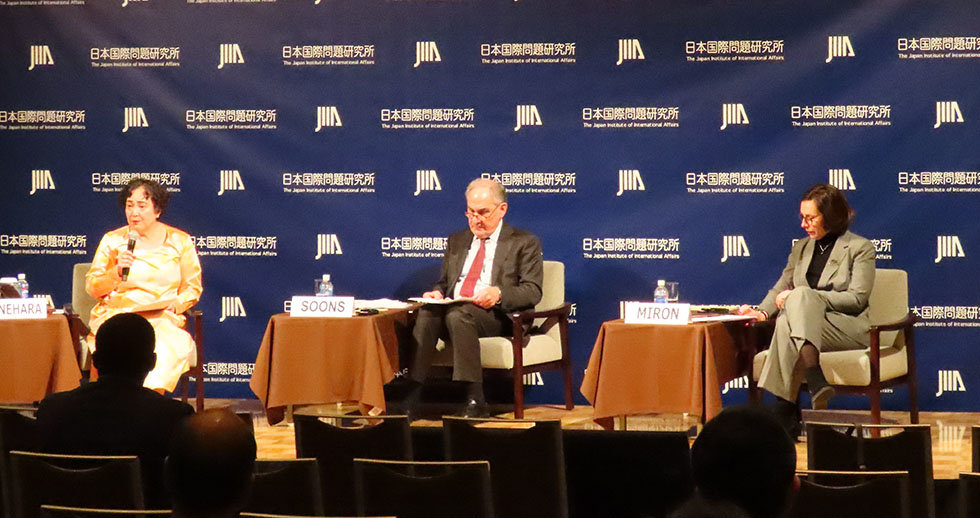 Part 2: Changes in the security environment and Japan's responses (2) Territory, sovereignty and the rule of law |
|
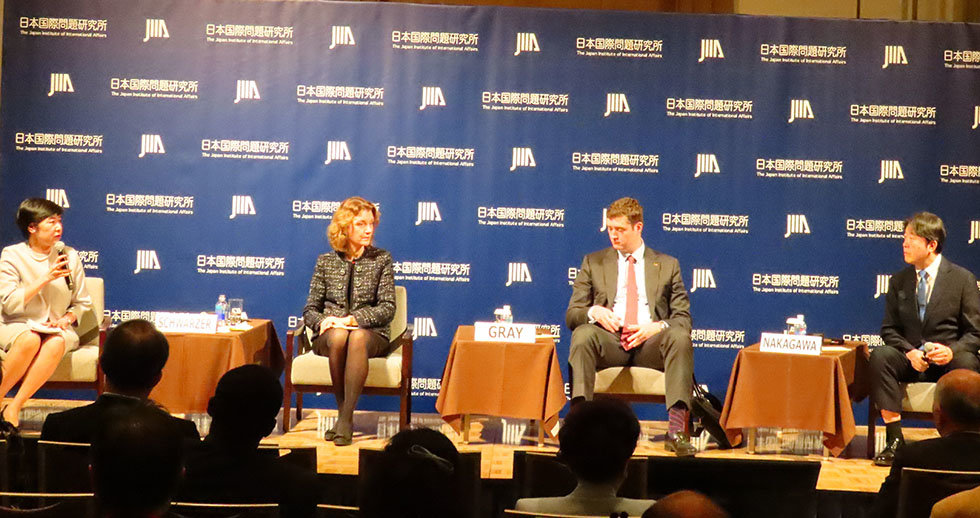 Part 3: Ukraine and the Middle East: The advent of an era of perennial conflict and the future of international security and cooperation (1) Perennial conflict: how do we deal with the "three fronts" of Ukraine, the Middle East and Asia? |
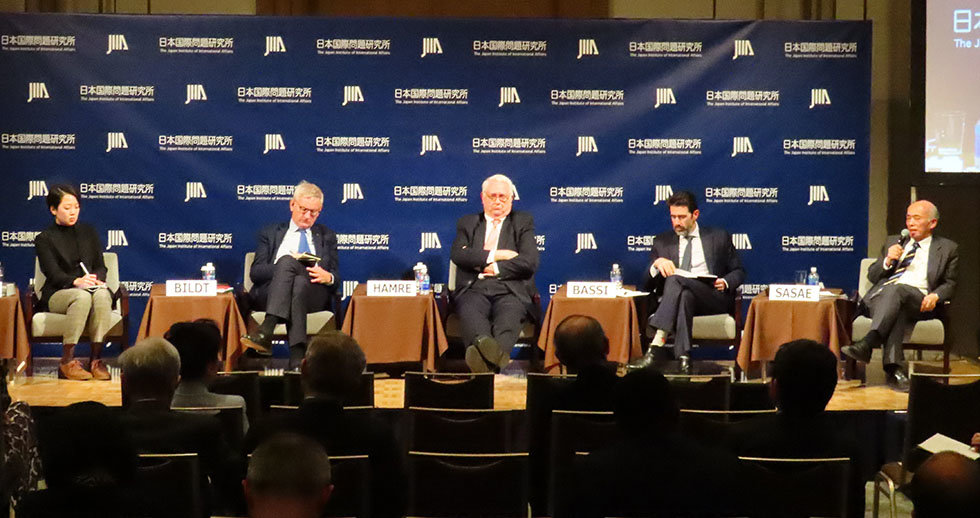 Part 3: Ukraine and the Middle East: The advent of an era of perennial conflict and the future of international security and cooperation (2) The future of international security and cooperation |
|
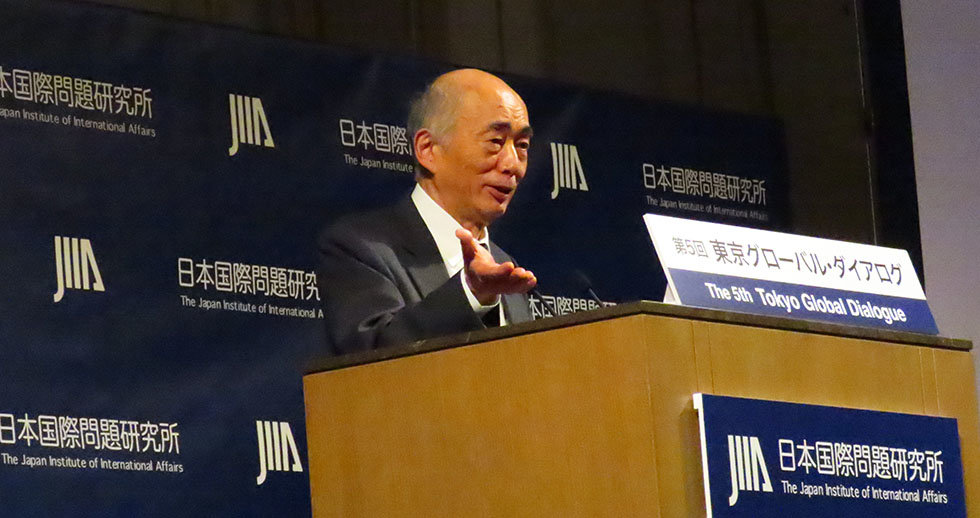 Closing |

